Items
Search full-text
Create Ability: A Conference on Creativity and Disability
-
"Radha O'Meara, Laura Dunstan, Anna Debinski, Catherine Ryan (2023). Disability and Screen Work in Australia: Report for Industry 2023. In Disability and Screen Work in Australia: Report for Industry. Melbourne Disability Institute, University of Melbourne." Disability is a key vector of inequality in Australian society. The screen industry has the potential to create meaningful change, in our workplaces and working practices, for our colleagues and our audiences. We need to pay more attention to disability and take more action to include disabled people in our industry. Disability equity, inclusion and accessibility training tailored to the screen industry can make a significant impact. Consultation, innovation and funding can transform industrial structures to create a more inclusive and sustainable industry for all screen workers. We must normalise talking about and providing access requirements to support disabled workers. The findings of this research reflect the need to build greater understanding, transparency and accountability in order to fully include disabled workers in the Australian screen industry.
-
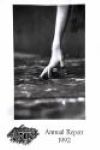 "Access Arts Annual Report 1992" Access Arts Annual Report 1992 - Director’s Report, Project Officer’s Report, Program Manager’s Report, exhibitions, workshops, regional arts, touring, (DADAA) at ARTAbility Conference at the Queensland Cultural Centre 1992
"Access Arts Annual Report 1992" Access Arts Annual Report 1992 - Director’s Report, Project Officer’s Report, Program Manager’s Report, exhibitions, workshops, regional arts, touring, (DADAA) at ARTAbility Conference at the Queensland Cultural Centre 1992 -
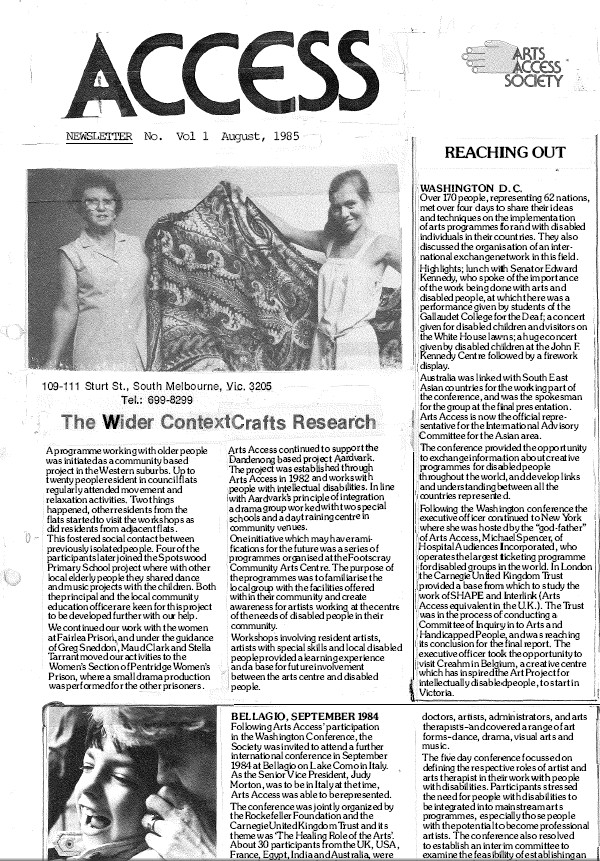 “Arts Access Victoria - Arts Access Society Inc. - Access Newsletter Vol.1 August 1985” Arts Access Arts Access Society Access Newsletter Vol.1 August 1985 - The Wider ContextCrafts Research – Aardvark Project, Reaching Out conference in Washington DC, conference in Bellagio, Italy, Programme - "A Day in the Life of Parkville Psychiatric Unit” video, Community programmes including Reaching out Cartwheel – Access Arts QLD - 'Cast Off' production, project – “Fair Play”, Arts Access Committee - Melbourne Zoo programme, Activities
“Arts Access Victoria - Arts Access Society Inc. - Access Newsletter Vol.1 August 1985” Arts Access Arts Access Society Access Newsletter Vol.1 August 1985 - The Wider ContextCrafts Research – Aardvark Project, Reaching Out conference in Washington DC, conference in Bellagio, Italy, Programme - "A Day in the Life of Parkville Psychiatric Unit” video, Community programmes including Reaching out Cartwheel – Access Arts QLD - 'Cast Off' production, project – “Fair Play”, Arts Access Committee - Melbourne Zoo programme, Activities - Michael Donnelly
- Belinda Mason Lovering
- Belinda Mason
-
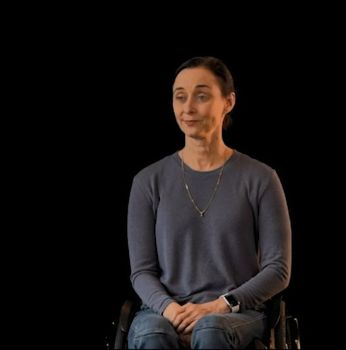 "Interview with Michelle Ryan" Michelle Ryan is the artistic director of Restless Dance Theatre and has extensive experience as a dancer and performer. Interview Summary Michelle Ryan, the artistic director of Restless Dance Theatre, shares her journey from being a successful dancer diagnosed with multiple sclerosis at 30 to becoming an advocate for artists with disabilities. Despite her initial hesitations to perform with her disability, a positive experience dancing with a European company reignited her passion and led her to Restless Dance Theatre, where she aims to change perceptions of who can create art. Michelle emphasizes the importance of providing professional opportunities and proper compensation for disabled artists, challenging the notion that disability work is charity or hobbyist. She advocates for representation that is genuine and not tokenistic, ensuring the inclusion of people with disabilities is meaningful and respectful.
"Interview with Michelle Ryan" Michelle Ryan is the artistic director of Restless Dance Theatre and has extensive experience as a dancer and performer. Interview Summary Michelle Ryan, the artistic director of Restless Dance Theatre, shares her journey from being a successful dancer diagnosed with multiple sclerosis at 30 to becoming an advocate for artists with disabilities. Despite her initial hesitations to perform with her disability, a positive experience dancing with a European company reignited her passion and led her to Restless Dance Theatre, where she aims to change perceptions of who can create art. Michelle emphasizes the importance of providing professional opportunities and proper compensation for disabled artists, challenging the notion that disability work is charity or hobbyist. She advocates for representation that is genuine and not tokenistic, ensuring the inclusion of people with disabilities is meaningful and respectful. -
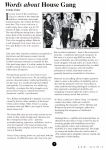 "Accessible Arts - ACE Arts Creativity Expression Accessible Arts - ACE Arts Creativity Expression - Antony Jones - Review: Words About House Gang - Iss15, Pg7" Accessible Arts - ACE Arts Creativity Expression - Antony Jones - Review: Words About House Gang- Iss15, Pg7 - reads, in part, "In every sense of the word House Gang is a sitcom in the American traditon. melodrama and simplecharacterisation, but without the blowwave hair. This is not a criticism, it could simply be no other way for 30 minutes of light, comedy television. The only difference being that in House Gang, three of the characters are played by people with intellectual disabilities: Trev is the struggling athlete; Belinda is self-obsessed, love-struck and out of love; and Robert is the soft, sensitive type."
"Accessible Arts - ACE Arts Creativity Expression Accessible Arts - ACE Arts Creativity Expression - Antony Jones - Review: Words About House Gang - Iss15, Pg7" Accessible Arts - ACE Arts Creativity Expression - Antony Jones - Review: Words About House Gang- Iss15, Pg7 - reads, in part, "In every sense of the word House Gang is a sitcom in the American traditon. melodrama and simplecharacterisation, but without the blowwave hair. This is not a criticism, it could simply be no other way for 30 minutes of light, comedy television. The only difference being that in House Gang, three of the characters are played by people with intellectual disabilities: Trev is the struggling athlete; Belinda is self-obsessed, love-struck and out of love; and Robert is the soft, sensitive type." -
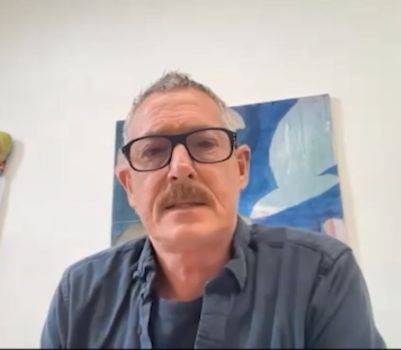 "Interview with David Doyle" David Doyle is the Executive Director of DADAA and has spent over 30 years leading large-scale Community Arts and Cultural Development (CACD) and arts projects globally and in Western Australia, significantly contributing to the arts and disability sectors through his work with DADAA and his dedication to community wellbeing and access to arts and culture. Interview Summary David Doyle, who originally trained in printmaking and ceramics with a background in community arts, has worked extensively in community arts and cultural development with a focus on addressing social issues through the arts. His experience with a disability from a young age and a deep understanding of power dynamics and privilege have influenced his motivation and commitment to disability arts in Australia. David highlights the significance of the Disability Discrimination Act and NDIS in empowering artists with disabilities and notes the uneven distribution of resources for disability arts across Australia. As the leader of an arts organization, he values the transition of power to individual artists with disabilities, stressing the importance of equipping them with the skills and contacts needed to lead and redefine the sector.
"Interview with David Doyle" David Doyle is the Executive Director of DADAA and has spent over 30 years leading large-scale Community Arts and Cultural Development (CACD) and arts projects globally and in Western Australia, significantly contributing to the arts and disability sectors through his work with DADAA and his dedication to community wellbeing and access to arts and culture. Interview Summary David Doyle, who originally trained in printmaking and ceramics with a background in community arts, has worked extensively in community arts and cultural development with a focus on addressing social issues through the arts. His experience with a disability from a young age and a deep understanding of power dynamics and privilege have influenced his motivation and commitment to disability arts in Australia. David highlights the significance of the Disability Discrimination Act and NDIS in empowering artists with disabilities and notes the uneven distribution of resources for disability arts across Australia. As the leader of an arts organization, he values the transition of power to individual artists with disabilities, stressing the importance of equipping them with the skills and contacts needed to lead and redefine the sector. -
"Victoria's Disability Resources Centre (DRC) created" 1981 saw a number of Disability Activists create the first Australian Disability Resources Centre (DRC) for Victorians with disabilities.
- ABC
- Disability and Arts Disadvantage and the Arts Australia (DADAA)
- DADAA National Network
- Kath Duncan
-
“Studio A established in 2000” Studio A (NSW) was established in 2000 to create access and opportunities for visual artists with intellectual disabilities; their in-house artists’ “practices range from painting and drawing to sculpture, textiles and digital media”. In their own words, “At Studio A, we are dedicated to professionally empower artists with disability and have their voices heard within contemporary Australian culture.”
-
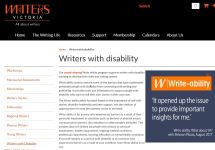 "Writeability website, captured 2018" Webpage reads, in part "Write-ability aims to remove some of the barriers that have traditionally prevented people with disability from connecting with writing and publishing. It provides tools and information to support people with disability who want to tell their own stories in their own way. The Write-ability ethos has been based on the importance of self-told stories, disability-leadership and peer support, and the creation of opportunities for even the quietest voices to be heard."
"Writeability website, captured 2018" Webpage reads, in part "Write-ability aims to remove some of the barriers that have traditionally prevented people with disability from connecting with writing and publishing. It provides tools and information to support people with disability who want to tell their own stories in their own way. The Write-ability ethos has been based on the importance of self-told stories, disability-leadership and peer support, and the creation of opportunities for even the quietest voices to be heard." -
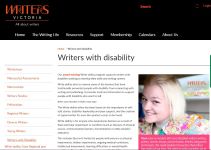 "Writeability website, captured 2019" Webpage reads, in part "Write-ability aims to remove some of the barriers that have traditionally prevented people with disability from connecting with writing and publishing. It provides tools and information to support people with disability who want to tell their own stories in their own way. The Write-ability ethos has been based on the importance of self-told stories, disability-leadership and peer support, and the creation of opportunities for even the quietest voices to be heard."
"Writeability website, captured 2019" Webpage reads, in part "Write-ability aims to remove some of the barriers that have traditionally prevented people with disability from connecting with writing and publishing. It provides tools and information to support people with disability who want to tell their own stories in their own way. The Write-ability ethos has been based on the importance of self-told stories, disability-leadership and peer support, and the creation of opportunities for even the quietest voices to be heard." -
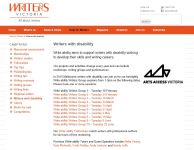 "Writeability website, captured 2015" Webpage reads, in part "Write-ability aims to support writers with disability wishing to develop their skills and writing careers. Our projects and activities change every year and can include workshops, writing groups and performances. In 2015 Melbourne writers with disability can join us for our fortnightly Write-ability Writers Group sessions from 1-3pm on the following dates. Please book one or more sessions."
"Writeability website, captured 2015" Webpage reads, in part "Write-ability aims to support writers with disability wishing to develop their skills and writing careers. Our projects and activities change every year and can include workshops, writing groups and performances. In 2015 Melbourne writers with disability can join us for our fortnightly Write-ability Writers Group sessions from 1-3pm on the following dates. Please book one or more sessions." - DADAA Network
-
”Bree Hadley, Janice Rieger, Sarah Barron, Sarah Boulton, Catherine Parker (2023) Codesigning Access: A New Approach to Cultures of Inclusion in Museums and Galleries. In Cachia, Amanda (Ed.) Curating Access: Disability Art Activism and Creative Accommodation. Routledge, Abingdon, Oxon, pp. 183-195.” "In museums and galleries, access is often designed and implemented by staff and informed by regulations and guidelines. Codesign approaches have the potential to shift this understanding away from designing access “for” visitors and toward access as a creative process developed “with” visitors. This chapter focuses on the exhibition and practice-led research project Vis-ability: Artworks from the QUT Art Collection, which was presented at the Queensland University of Technology (QUT) Art Museum in Australia in 2019. Vis-ability represented the culmination of five years of international research into access in museums and galleries for visitors who are blind or have low vision."
-
“Bus Stop Films begins operation in 2009” Bus Stop Films began operations in 2009. In their own words, they “educate, create and advocate.” Their primary focus is teaching filmmaking to disabled adults, but they also offer workshops to others of marginalised identities. Bus Stop “makes films with, for and about people from diverse backgrounds and abilities.” Their website lists support workers in every Australian state and territory.
-
“Sally Chance works with participants with disabilities, leading to the founding of Restless Dance Theatre” In 1989, UK-based community dance worker Sally Chance was invited to participate in the Come Out festival in Adelaide. She returned to South Australia the next year and begun the work with participants with disabilities which lead to the founding (alongside Tania Rose) of Restless Dance Theatre in 1991. Restless Dance Theatre continues to create and exhibit work by integrated ensembles. Their extensive performance history is available in the AusStage database. (see https://www.ausstage.edu.au/pages/organisation/7046)
-
"Bree Hadley (2022) A ‘Universal Design’ for audiences with disabilities? In Reason, Matthew, Connor, Lynne, Johanson, Katia, & Walmsley, Ben (Eds.) Routledge Companion to Audiences and the Performing Arts. Routledge, Abingdon, Oxon, pp. 177-189.” “Understanding of how to create inclusive performance experiences for spectators with disabilities remains nascent in research, policy, and practice. In this chapter, I survey the state of knowledge in this field – or, as it turns out, fields, given that specialist knowledge of sign language interpretation for d/Deaf spectators, audio description for blind spectators, and relaxed performance for neurodiverse spectators, has developed separately, without intersection. I then investigate recent efforts to create inclusive aesthetics that incorporate accessibility features into performance work, as an integral part of the aesthetic, rather than as interpretations, captions, or descriptions alongside the work. I examine why this ‘Universal Design’ approach has been embraced with enthusiasm, both by disabled producers and spectators, and by non-disabled producers and spectators.”
-
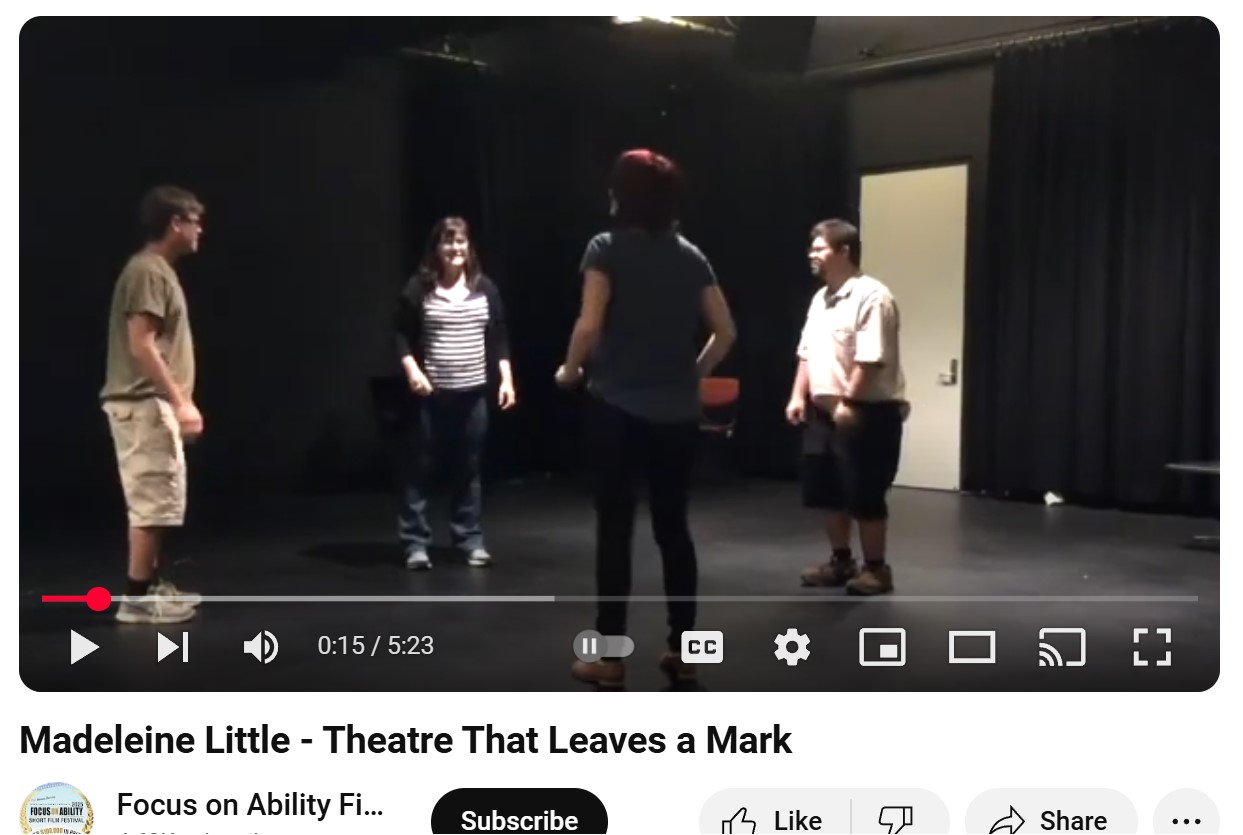 "Documentary by Madeleine Little on Indelability Arts - Theatre that leaves a Mark" Documentary by Madeleine Little on Indelability Arts - "Theatre that leaves a Mark" for Focus On Ability Film Festival
"Documentary by Madeleine Little on Indelability Arts - Theatre that leaves a Mark" Documentary by Madeleine Little on Indelability Arts - "Theatre that leaves a Mark" for Focus On Ability Film Festival -
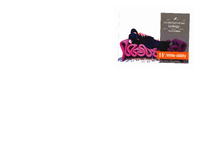 "Writers Victoria profile postcards of Write-ability Fellows - Sarah Widdup"
"Writers Victoria profile postcards of Write-ability Fellows - Sarah Widdup"
